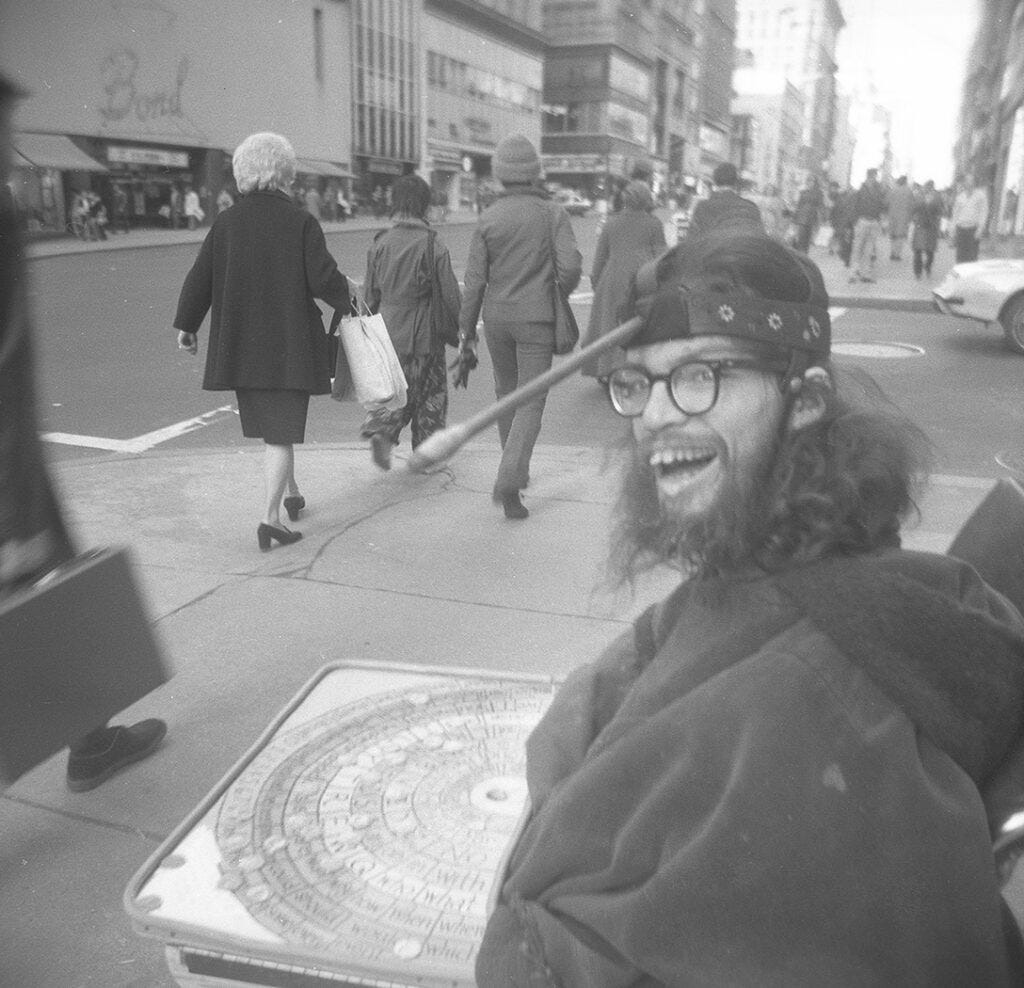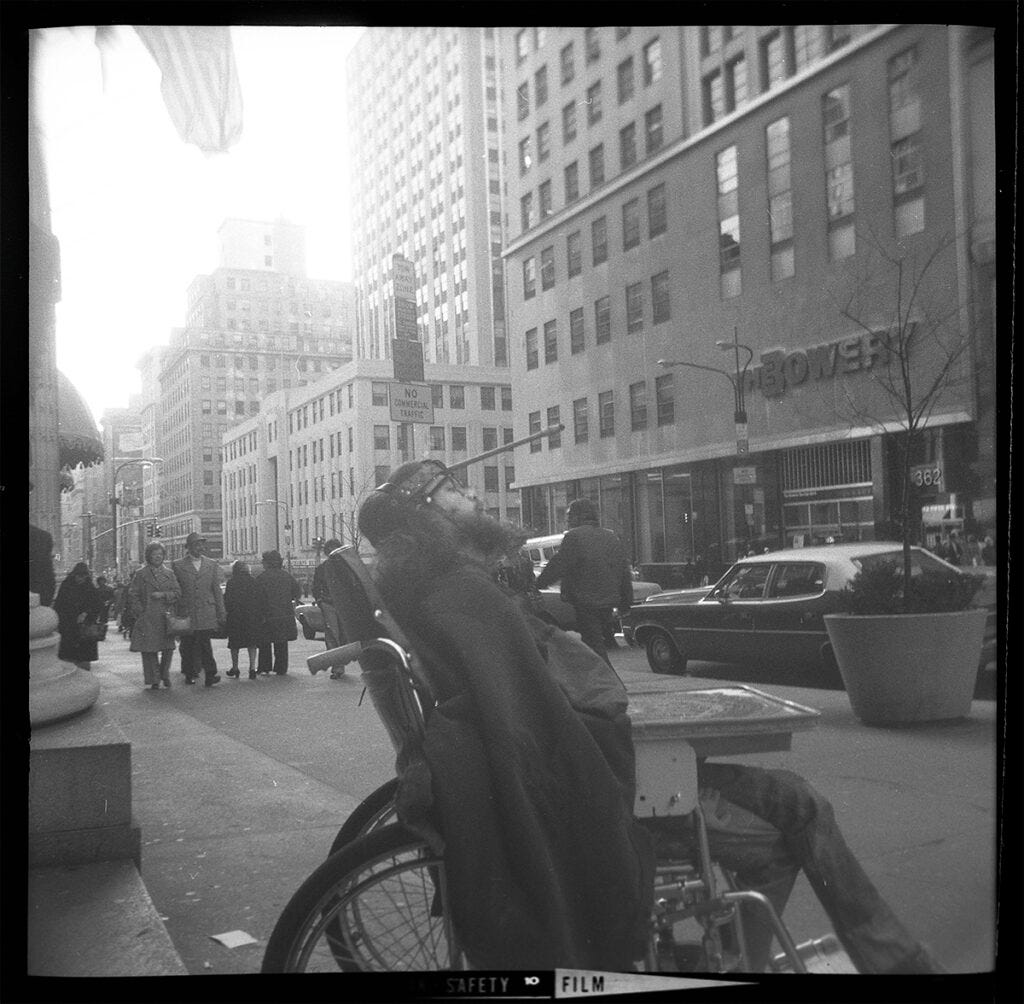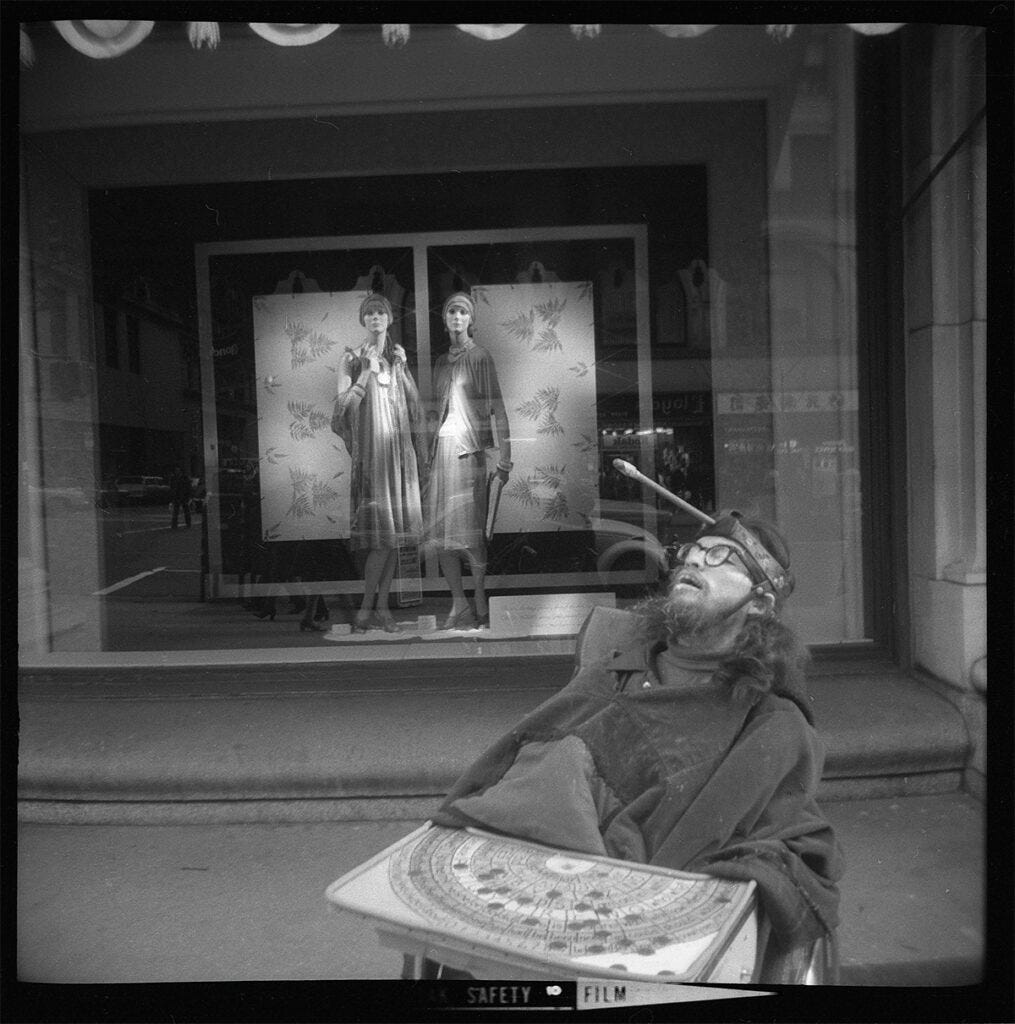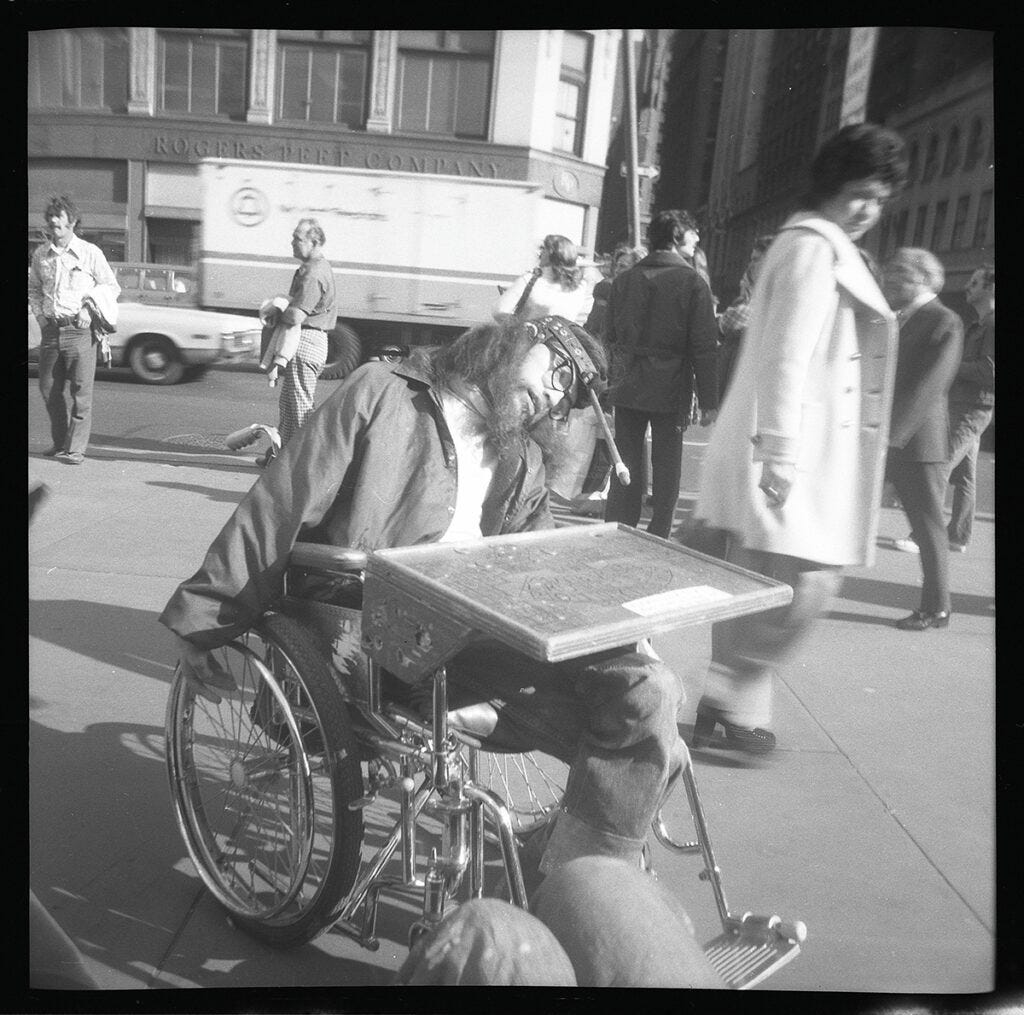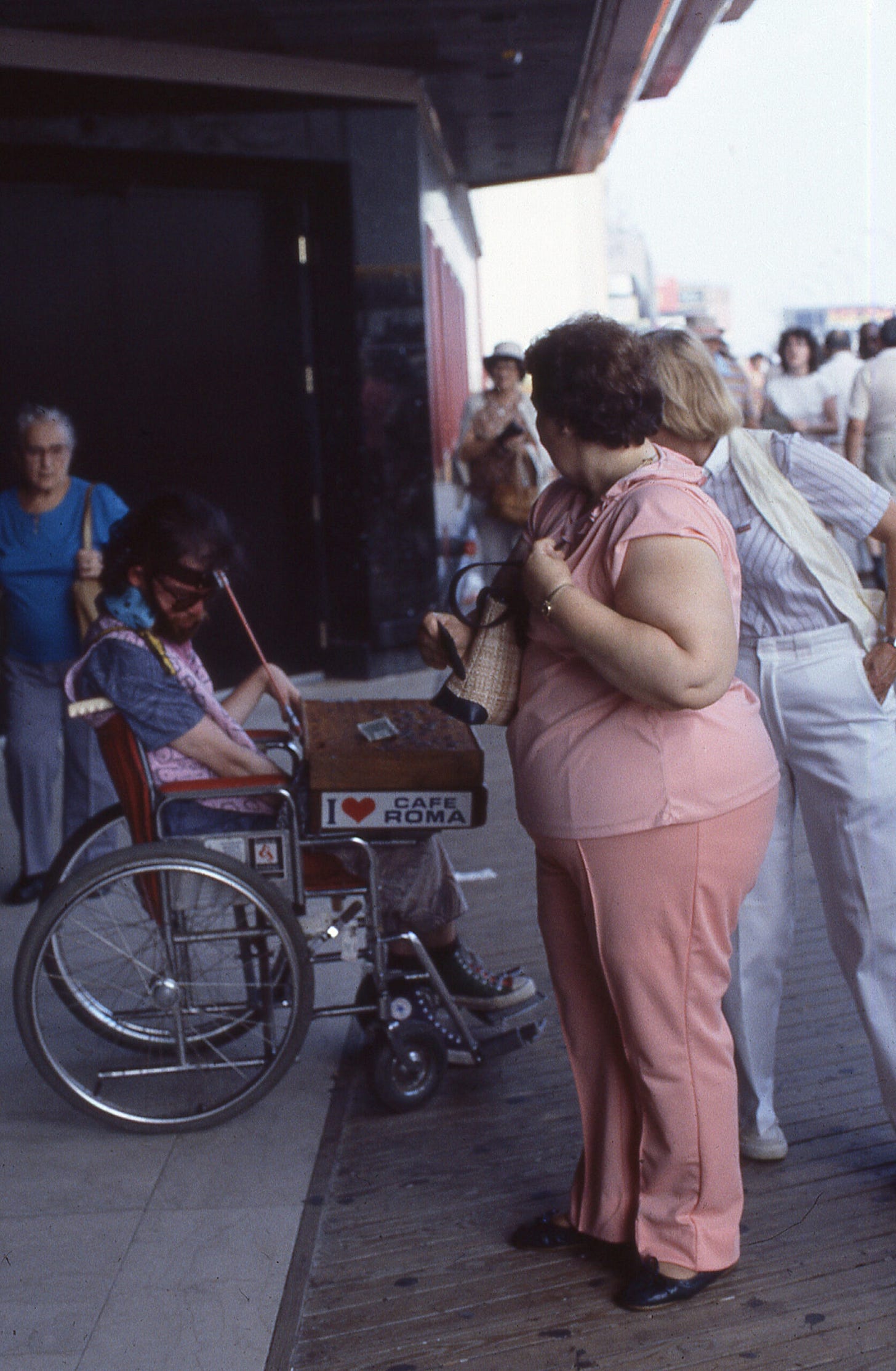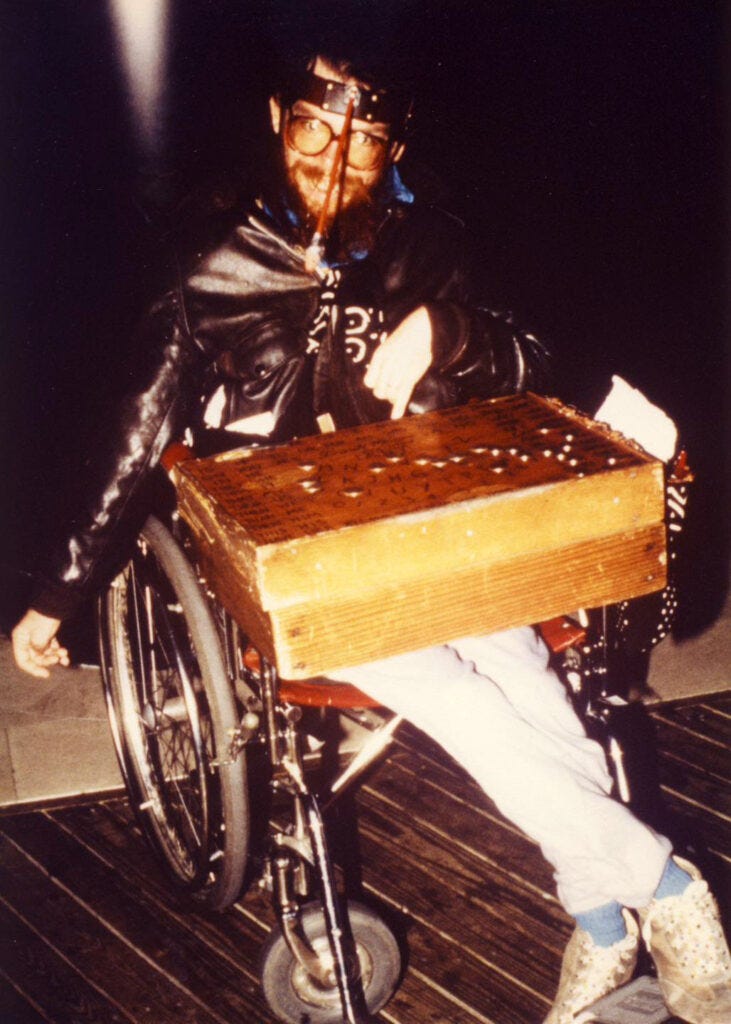Panhandling
From How To Handle an Anthropologist, Session 13, February 27, 1998, Nonfilms
Russell: So you were selling newspapers?
Frank: Yes. Really people just gave me money.
Russell: You mean they didn’t buy newspapers?
Frank: (makes “yes” sound) Or tip me.
Russell: So the money was just … what was the money for?
Frank: It was just for me.
Russell: They were just being kind or generous?
Frank: It varied. Like some people did not even look at me.
Russell: Most people didn’t give a damn, right?
Frank: The poor give because they like me.
Russell: You mean poor people?
Frank: They are who give the most.
Russell: So did you feel weird about people giving you money or did you not? Just accept it?
Frank: Yes. Because on one level it serves a function for people to be able to give, and on another level I was never there mainly for the money. I was people watching and people fishing.
Russell: On another level you also needed money.
Frank: But if that is your main reason then they feel that.
Russell: You weren’t there for money because you didn’t want them to feel it?
Frank: No. The reverse. (laughs)
Russell: Even if you had not needed money you would have been there?
Frank: Yes. Which has been the case most of the time.
Russell: Was this the first time?
Frank: Yes.
Russell: Is that what led you into the possibilities of that, of being there?
Frank: Yes. Like I have always people watched. This was more interactive.
Russell: And you were OK with the interactions?
Frank: Yes.
Russell: I am only saying that because of many people, disabled people among them, who have been in that situation. You understand my point?
Frank: Why?
Russell: I have no judgment on it myself but I think there might be many disabled people who might feel that you were perhaps leaning on past images or perceptions of disability, and not being on the forefront of new roles and images for people with disabilities. Now, like I said, it’s all a construction to me, but many people load it valuably.
Frank: (laughs) Well at that time I was wearing a jean skirt. (laughs)
Russell: So? What does that mean? What are you saying?
Frank: Not the old image.
Russell: But clothing sometimes detracts from images, as you’re well aware of.
Frank: Seriously, what you put out affects the image.
Russell: Yeah, but intent and role in clothing, I don’t see where it could affect it. We’re going too far off here, this philosophical …
Frank: I was joking.
Russell: (laughs) OK. But you still need to give me something in terms of your reasoning and intent around that issue.
Frank: What issue?
Russell: The issue of your difference from the way many people would view that situation.
Frank: If I thought it was demeaning I would not do it.
Russell: I have no doubt, but at some point, maybe in a more general discussion not connected to any particular incident or period, I want to bring up this idea again. For one, because I think you have something important to contribute on the subject, I think you have a lot to contribute on that subject. You could provide insight. So, it’s not just my obstinance.
Frank: Like the real old image is crips should be at home or in some out of sight place, or when they are on the street they are in a desperate situation. I was not in either of those. I was living a life in the outside world.
Russell: My image was the image of the disabled beggar. People in medieval times would even disable themselves so that they could beg for food. That’s the image that I’m talking about, that a lot of people try to distance themselves from. What is the difference in your thinking?
Frank: But why? Like if the crip did it to survive, that is a strong person.
Russell: You’re getting into dynamics of the person existing and doing what it takes. They may be changing or trying to change that image to fit the sociopolitical situation today.
Frank: They should celebrate those people.
Russell: I’m not sure about celebrating. I think they accept them but again want to get away from that kind of image in the sociopolitical environment today. I have the unusual ability to be able to see everybody’s point of view about everything. (laughs)
It causes me a lot of problems sometimes but ultimately I think it’s good for the kind of work that I’m doing.
Frank: And in the hippy culture in the 1970s panhandling was an acceptable way of making money. Like hitchhiking was normal.
Russell: I also understand it was different times. I also wanted to see what you felt about that point of mine, what I brought up, because I think it’s important to get at the gist of what different people are about in terms of their orientations and what acts they feel comfortable and uncomfortable doing. Again, different times and sometimes the pressures of accepting all the principles of some doctrine can be pretty authoritarian.
Frank: Like a lot of people said crips should not be on a stage.
Russell: So you didn’t listen to them. (laughs)
Frank: Who was crips? (laughs)
Russell: Right. Where were we? (laughs) We got off on a good tangent there. I like those tangents. (laughs)
Frank: When someone stopped to talk it got deep.
Russell: So you got into a lot of discussions.
Frank: And that is how a rich woman asked me if I would paint her.
Russell: You said during the discussion that you painted, and she asked you to paint her.
Frank: (makes “yes” sound) She came to our house to see my paintings, but wanted me to paint her at her house.
Russell: So what happened?
Frank: We took my stuff to her big house. (laughs) She took her clothes off. A light went on in my head.
Russell: So you weren’t expecting her to take her clothes off?
Frank: No. It was the first time I painted a live person.
Russell: So when you say a light went off you mean that this was something to get into, expand on?
Frank: Yes. That art gives people an excuse or a context to do what they would not normally do. I did see that in class. But the class context may have been operating but this was just a start. So I started doing nonfilms.
NEW YORK CITY CIRCA 1974
SAN FRANCISCO, 1980
ATLANTIC CITY, NEW JERSEY, 1984
photos by Mary Sullivan

